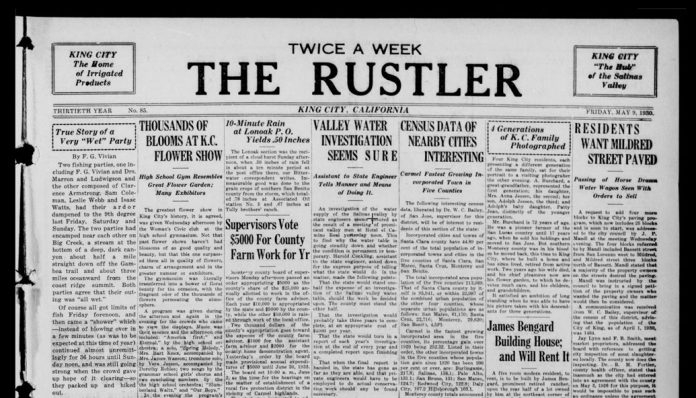
KING CITY — San Antonio Valley Historical Association (SAVHA) has announced that issues of the King City Rustler newspaper from 1926 to 1936 are now available online through the California Digital Newspaper Collection (CDNC).
Donations from SAVHA began the process in 2019 to upload copies of the newspaper starting in 1901 and running through 1925. Donations from 2020 helped continue the process in cooperation with the University of California at Riverside, which hosts the online newspaper collection.
Anyone with access to the internet can use the information for family or historical research by going to cdnc.ucr.edu. When searching by county (Monterey), a link will come up for the King City Rustler.
The Rustler newspaper, started by Fred Vivian in 1901, has been published continuously for 120 years. A feature of the newspaper were columns that focused on the rural areas of Southern Monterey County, including the San Antonio Valley, which covers the Jolon and Lockwood areas.
Those interested in the preservation of history are invited to donate to eventually have all 120 years accessible online. Donations can be sent to SAVHA at P.O. Box 145, Lockwood, CA 93932, with a notation that the money is earmarked for the CDNC project.
The California Digital Newspaper Collection is a freely accessible repository of digitized Golden State newspapers available at cdnc.ucr.edu. It contains about 5 million pages from counties throughout the state and from the first newspaper printed in 1846 to the present.
The project has more than 25,500 registered users, 4,300 of whom have corrected more than 14 million lines of computer-generated text. This human-verified and -corrected text then becomes searchable by other users.
The Center for Bibliographical Studies and Research (CBSR) at UC Riverside began digitizing newspapers in 2005, as one of the original participants in the Chronicling America project, a joint venture of the National Endowment for the Humanities and the Library of Congress.
CBSR officially launched the CDNC in 2007 with the initial 100,000 pages it had created for Chronicling America, and since then has partnered with dozens of local libraries and historical societies to help them digitize their papers.














